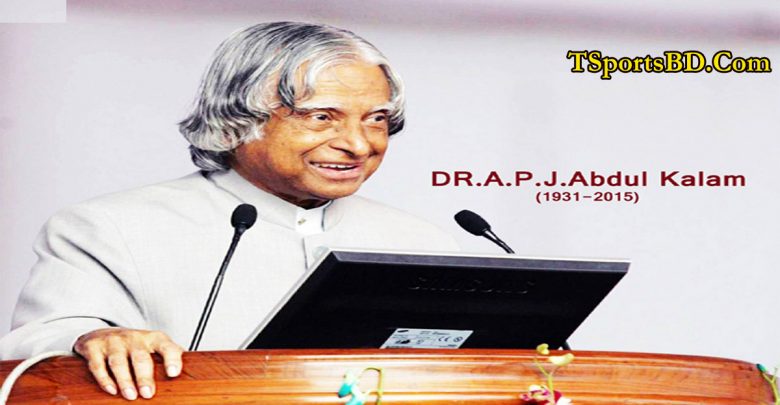Dr. APJ Abdul Kalam Biography, Net Worth, Age, Wife, Death, Books And Achievement

Dr. APJ Abdul Kalam Biography, Net Worth, Age, Wife, Height, Weight, Affairs, Quotes, Death, Books & Achievement. A.P.J. Abdul Kalam is an Indian scientist and politician who served his country as President from 2002 to 2007. Abdul Kalam was an astronaut who joined the Indian Defense after graduating from the Madras Institute of Technology. He is known as a prominent figure in the development of the country’s nuclear power. And a nation’s hero in building the country’s scientific power. Abdul Kalam served the country as President from 2002 to 2007. On July 2, 2015, he died of a heart attack.
Kalam was elected the 11th President of India in 2002 with the support of the ruling Bharatiya Janata Party. And the then opposition Indian National Congress. Widely referred to as the “People’s President”, he returned to education. Writing and public service at the end of his single term. He was the recipient of several prestigious awards, including the Bharat Ratna, India’s highest civilian honor. While giving a lecture at the Indian Institute of Management Shillong. Kalam died on July 27, 2015 at the age of cardiac arrest. Thousands of people, including national dignitaries. Attended his funeral at Rameshwaram, his birthplace. Where he was buried with full state honors.
Who Was A.P.J. Abdul Kalam?
A.P.J. Abdul Kalam was an astronaut who joined the Indian Defense Department after graduating from the Madras Institute of Technology. He was a central figure in the development of the country’s nuclear capabilities and was hailed as a national hero in 1998 after a series of successful tests. Kalam was President of India for one term from 2002 to 2007 and died of a heart attack in July. 27, 2015. This person’s educational qualification is a bachelor’s degree in physics from Madras University, St. Joseph’s College in 1954. Degree in Space Engineering from Madras Institute of Technology in 1960.

APJ Abdul Kalam Early life and education
Abdul Kalam was born on 15 October 1931 to a Tamil Muslim family in the pilgrimage centre of Rameswaram on Pamban Island. Then in the Madras Presidency and now in the State of Tamil Nadu. Kalam father Jainulabdeen Marakayar was a boat owner and imam of a local mosque. His mother Ashiamma was a housewife. His father owned a ferry that took Hindu pilgrims back and forth between Rameswaram and the now uninhabited Dhanushkodi.
In his school years, Kalam had average grades but was described as a bright and hardworking student who had a strong desire to learn. He spent hours on his studies, especially mathematics. After completing his education at the Schwartz Higher Secondary School, Ramanathapuram, Kalam went on to attend Saint Joseph’s College, Tiruchirappalli, then affiliated with the University of Madras, from where he graduated in physics in 1954. He moved to Madras in 1955 to study aerospace engineering in Madras Institute of Technology.
APJ Abdul Kalam Personal life
Kalam was the youngest of five siblings, the eldest of whom was a sister, Asim Zohra (d. 1997), followed by three elder brothers: Mohammed Muthu Meera Lebbai Maraikayar (5 November 1916 – 7 March 2022), Mustafa Kalam (d. 1999) and Kasim Mohammed (d. 1995). He was extremely close to his elder siblings and their extended families throughout his life, and would regularly send small sums of money to his older relations, himself remaining a lifelong bachelor.
Kalam was noted for his integrity and his simple lifestyle. He never owned a television, and was in the habit of rising at 6:30 or 7 a.m. and sleeping by 2 a.m. His few personal possessions included his books, his veena, some articles of clothing, a CD player and a laptop; at his death, he left no will, and his possessions went to his eldest brother, who survived him.

Abdul Kalam Career as a scientist
After graduating from the Madras Institute of Technology in 1960, Kalam joined the Defense Research and Development Service (DRDS) of the Defense Information Research and Development Organization (Government of India) as a scientist. ). He began his career designing a small hovercraft, but was unsure of his choice for a job at DRDO. Kalam was also part of the Incosper Committee under the famous astronomer Vikram Sarabhai. In 1969, Kalam was transferred to the Indian Space Research Organization (ISRO) where he was the project director of India’s first satellite launch vehicle (SLV-III), which successfully launched the Rohini satellite into orbit near Earth in July 1980; Kalam first started work on an expandable rocket project independently at DRDO in 1969.
Abdul Kalam Presidency
Kalam served as the 11th President of India, after KR Narayanan. He won the 2002 presidential election with 922,884 votes, surpassing Lakshmi Sehgal’s 107,366. His term was from 25 July 2002 to 25 July 2007. On June 10, 2002, when the National Democratic Alliance (NDA) was in power, they announced that they would nominate Kalam for the presidency, and both the Socialist Party and the Nationalist Congress Party supported his candidacy.
After the Samajwadi Party announced its support for Kalam, Narayanan decided not to run for a second term, leaving the field clean. Regarding the announcement of his candidacy, Kalam said: I was really overwhelmed. In both the internet and other media, I have been asked for a message. I was wondering what message I could give to the people of the country at this moment. On 18 June, Kalam Vajpayee and his senior cabinet colleagues submitted their nomination papers to the Indian Parliament.

APJ Abdul Kalam Post-presidency
After leaving office, Kalam became a visiting professor at the Indian Institute of Management Shillong, the Indian Institute of Management Ahmedabad and the Indian Institute of Management Indore; Honorary Fellow of the Indian Institute of Science, Bangalore; Chancellor of the Indian Institute of Space Science and Technology Thiruvananthapuram; Professor of Aeronautical Engineering at Anna University; And an addition to many other academic and research institutions across India.
He taught at the International Institute of Information Technology, Hyderabad, and at Benares Hindu University and Anna University. In 2011, Kalam was criticized by civic groups for its position on the Kudankulam nuclear power plant; He supported the establishment of nuclear power plants and was accused of not talking to locals. Protesters were hostile to his visit because they saw him as a nuclear scientist and were dissatisfied with his assurances about the plant’s safety features. In May 2012, Kalam launched a program called The What Can I Give Movement for the youth of India on the central theme of defeating corruption.
APJ Abdul Kalam Death and Legacy
On July 2, 2015, while lecturing at the Indian Institute of Management, Kalam suffered a heart attack and later died at the age of 3. Kalam was originally buried in Tamil Nadu in July with his state honors. In honor of the scientist and former president, the state government of southeastern India in Tamil Nadu has created a “Dr. APJ Abdul Kalam Award”, recognizing exceptional individuals who promote science, students and humanity. The government has also declared Kalam’s birthday (October 15) as “Youth Renaissance Day”.
Discussions are underway to build a large-scale memorial to his grave. Among his many accolades, including honorary doctorates from Defense0 universities, he was awarded the Padma Bhushan (1981), the Padma Bhushan (1990) and the Bharat Ratna (1997) – India’s highest civilian award for his contribution to the modernization of government defense technology. He also wrote several books in 1999, including the autobiography Wings of Fire.
Abdul Kalam Memorial
Dr. APJ Abdul Kalam National Memorial was built by DRDO at Pei Karumbu in the island town of Rameshwaram in Tamil Nadu in memory of Kalam. It was inaugurated by Prime Minister Narendra Modi in July 2011. The display includes replicas of rockets and missiles that Kalam worked with. Acrylic paintings about his life are displayed along with hundreds of portraits depicting the life of a mass leader. There is a statue of Kalam at the entrance which shows him playing the harp. There are two more small statues of the leader in sitting and standing postures.
APJ Abdul Kalam Awards and honours
Kalam has received honorary doctorates from 400 universities. He was awarded the Padma Bhushan in 1981 and the Padma Bhushan in 1990 by the Government of India for his work with ISRO and DRDO and for his role as Scientific Adviser to the Government. In 1997, Kalam received India’s highest civilian honor, the Bharat Ratna, for his contribution to scientific research and modernization of defense technology in India. On 2013, he received the Von Brown Award from the National Space Society for “recognition of excellence in the management and leadership of a space-related project.” In 2012, Kalam was ranked No. 2 in Outlook India’s Greatest Indian Survey.

DR. APJ Abdul Kalam Best Quotes
- “Don’t take rest after your first victory because if you fail in second, more lips are waiting to say that your first victory was just luck.”
- “To succeed in your mission, you must have a single-minded devotion to your goal.”
- “If you fail, never give up because FAIL means “First Attempt In Learning.
- “All of us do not have equal talent. But , all of us have an equal opportunity to develop our talents.”
- “Be active! Take on responsibility! Work for the things you believe in. If you do not, you are surrendering your fate to others.”
- “You cannot change your future, but you can change your habits, and surely your habits will change your future.”
- “We have no ability to be equal to all have opportunities equal to their ability lane.”
- “It is very Easy To Defeat Someone, But it is Very Hard To Win Someone.”
- “If you want to shine like a sun, First burn like the sun.”
- “Your best teacher is your last mistake.”
Last Word
Thanks for Staying with us. Here we give details Information About Dr. APJ Abdul Kalam Biography, Net Worth, Age, Wife, Death, Books & Achievement. To get more Information Please Visit TSportsBD.Com .


